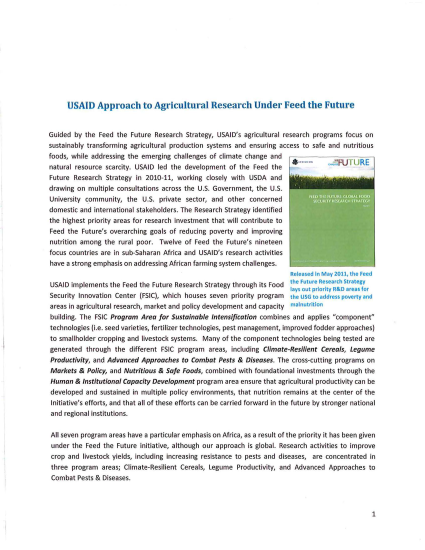Guided by the Feed the Future Research Strategy, USAID's agricultural research programs focus on sustainably transforming agricultural production systems and ensuring access to safe and nutritious foods, while addressing the emerging challenges of climate change and natural resource scarcity. USAID led the development of the Feed the Future Research Strategy in 2010-11, working closely with USDA and drawing on multiple consultations across the U.S. Government, the U.S. University ~ommunity, the U.S. private sector, and other concerned domestic and international stakeholders. The Research Strategy identified the highest priority areas for research investment that will contribute to Feed the Future's overarching goals of reducing poverty and improving nutrition among the rural poor. Twelve of Feed the Future's nineteen focus countries are in sub-Saharan Africa and USAID's research activities have a strong emphasis on addressing African farming system challenges.
Security Innovation Center (FSIC), which houses seven priority program the USG to address poverty and areas in agricultural research, market and policy development and capacity malnutrltlon building. The FSIC Program Area for Sustainable Intensification combines and applies "component" technologies (i.e. seed varieties, fertilizer technologies, pest management, improved fodder approaches) to smallholder cropping and livestock systems. Many of the component technologies being tested are generated through the different FSIC program areas, including Climate-Resilient Cereals, Legume Productivity, and Advanced Approaches to Combat Pests & Diseases. The cross-cutting programs on Markets & Policy, and Nutritious & Safe Foods, combined with foundational investments through the Human & Institutional Capacity Development program area ensure that agricultural productivity can be developed and sustained in multiple policy environments, that nutrition remains at the center of the Initiative's efforts, and that all of these efforts can be carried forward in the future by stronger national and regional institutions.
All seven program areas have a particular emphasis on Africa, as a result of the priority it has been given under the Feed the Future initiative, although our approach is global. Research activities to improve crop and livestock yields, including increasing resistance to pests and diseases, are concentrated in three program areas; Climate-Resilient Cereals, Legume Productivity, and Advanced Approaches to Combat Pests & Diseases.








Comment
Make a general inquiry or suggest an improvement.